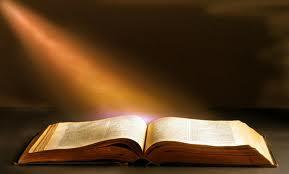
The bedraggled reader of the Old Testament, arriving at the book of Ruth and paging forward with trepidation, will experience relief upon discovering it's barely four pages long, too brief to be tedious. This first, favorable impression is too faint. The book of Ruth is actually entertaining, artistic, and, in its way, uplifting, an inspired counterpoint to all the killing of the various foreign-ites that figures prominently in Joshua and Judges. It's placement in the Bible is also chronologically incorrect, so, to grasp its import, we glance fore and aft.
The first seven books of the Bible tell a story that may be outlined as follows: primeval history, the adventures of the patriarchs, bondage in Egypt, the exodus, the wilderness years, and the conquest of "the promised land." At the end of the book of Judges, Israel has gained at least a foothold in Canaan, where as a loose confederation of tribes it is coexisting with other peoples. Then comes Ruth, which is followed by the historical writings collected in the books of Samuel, Kings, and Chronicles. The historical books carry the story forward and, in their most memorable sections, describe Israel at its zenith of power and prosperity, a united kingdom under King David's rule. By the end of Chronicles, however, the former conquering Israelites are themselves conquered by the Babylonians, the temple at Jerusalem is sacked, and Israel suffers a second captivity. The books of Ezra and Nehemiah, which amount to an appendix to Chronicles, predictably attribute the Babylonian captivity to Israel's worldliness and falling away from the Mosaic faith. The recommended reforms involve a re-emphasis on Israel's exclusivity as the chosen people of God.
So, with that in mind, here is what happens in Ruth. An Israeli family of four--father, mother (Naomi), and two sons--is forced by a famine to travel to Moab. The sons each marry a Moabite girl, one named Orpah (no, not Oprah) and the other, Ruth. Within ten years, the three men all die. Naomi thus finds herself in a foreign land, alone except for her foreign daughters-in-law, who are themselves widows. Hearing that the famine at home is ended, Naomi determines to return, and she sets out with Orpah and Ruth. The text quite skillfully conveys, without explicit statement, Naomi's complicated feelings toward her daughters-in-law. They are her closest remaining human contacts, and she loves them. She also thinks that their prospects, including for marriage, are better in Moab. Along the way, therefore, she has a wrenching conversation with the two younger women in which she urges them to go back to Moab. She prevails with Orpah, but Ruth, having heard her out, replies:
Entreat me not to leave you or to return from following you; for where you go I will go, and where you lodge I will lodge; your people shall be my people, and your God my God. May the Lord do so to me and more also if even death parts me from you.
And so Naomi and Ruth set up what might be called a nontraditional household in the Bethlehem area--as timing has it, just as the barley harvest is beginning. While working in a field, Ruth attracts the attention of the landowner, a certain Boaz, a prominent citizen and a relation of Naomi's dead husband. Intrigue ensues, the resolution of which is prelude to the following coda:
So Boaz took Ruth and she became his wife; and he went in to her, and the Lord gave her conception, and she bore a son. . . . Then Naomi took the child and laid him in her bosom, and became his nurse. And the women of the neighborhood gave him a name, saying, "A son has been born to Naomi." They named him Obed; he was the father of Jesse, the father of David.
Now these are the descendants of Perez: Perez was the father of Hezron, Hezron of Ram, Ram of Amminadab, Amminadab of Nahshon, Nahshon of Salmon, Salmon of Boaz, Boaz of Obed, Obed of Jesse, and Jesse of David.
The Bible is full of genealogical fill. In the part behind us, it's invariably a sign of the tiresome, officious priestly source. Listen to the roll of names, our proud heritage, the generations of God's elect brought up to current times! Every detail in the unassuming book of Ruth appears calculated to upend this tendency. I say "unassuming" because, up to the conclusion, the details are drawn entirely from ordinary, private life. When, for example, Naomi reflects that Ruth's chances for marriage are better in Moab, the reader must feel that she's right--a conclusion that tends to place Israel in an unfavorable light. There are other details that my rough summary of the plot skips, such as the way Naomi advises her foreign daughter-in-law about what little tricks might be deployed to encourage Boaz. It's a story of everyday life that, emphasizing as it does what seem like ordinary (but attractive) human ties between people from different places, implicitly criticizes the view that Israel is set apart.
But the heaviest blow falls at the very end. The scope widens and the author, whoever he was, rather casually lays out a family tree that, without calling out the name of Ruth, reveals that this woman from Moab was a great-grandmother of King David. It would be a little like if Thomas Jefferson, instead of just sleeping with a slave and siring what under the Constitution was three-fifths of a person, had been one-eighth African himself.
